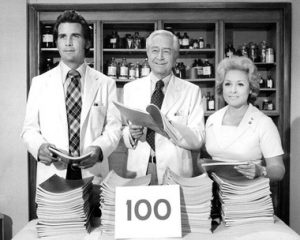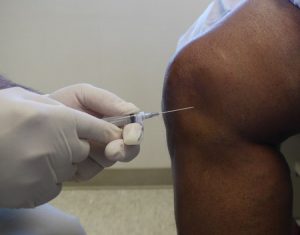Many people wonder why they need a primary care physician (PCP), the purpose of a primary care physician and what treatments/conditions they are trained to treat. I was recently quoted in an article published by Medical Economics regarding this same issue so thought I would share my comments with a broader audience.
Twenty to 50 years ago, the role and importance of a PCP was not in question, but as more and more people choose to rely on specialists for most of their care it is even more important to explain why everyone needs a primary physician.

Old fashioned Doctor and his team
One of the key roles of a PCP is to “captain the ship” for their patients. The PCP should be the first point of contact for patients. In the era where everyone thinks they need a specialist, the role of the PCP has been minimized, but in fact this is the most important person on your medical team besides you, the patient. Your PCP is going to be the one physician who knows everything about you and is keeping track of all of your medical conditions and how each one of them may relate to your other conditions. Specialists are focused on their specific area of expertise. For example, a cardiologist’s focus is your heart and is probably not asking questions about your skin condition or your thyroid problem and may start medications that can make these other conditions worse. If you have a PCP on your side they are overseeing everything and are focusing on the “whole picture.”

Primary Care Physician with her Patient
Not convinced why you should always see your PCP before seeing a specialist? Consider this…….
- Your PCP may be able to handle your concern/problem, as 80-90% of healthcare needs can be handled by PCPs.
- The problem may not be what you think it is and you may refer yourself to the wrong specialist, thereby wasting your time and money.
- Specialist visits are more expensive and in today’s healthcare environment where patients are paying for more services out of pocket, this visit can be quite costly, especially if you really didn’t need to see a specialist in the first place.
Other benefits of a PCP is that most perform a wide range of examinations and treatments for their patients, including chronic disease management such as, Diabetes, Congestive Heart Failure, High Blood Pressure, Anxiety and Depression, Asthma, COPD/emphysema, and gastrointestinal disorders, among others. PCPs also deal with acute illnesses like gastroenteritis, Pneumonia, Influenza and skin infections, which can help patients avoid a trip to an urgent care center or emergency room. In our office we even perform routine procedures, like joint injections, skin biopsies and laceration repairs. Not only is this convenient for patients, it can save them substantial money by not having to see a specialist or go to the emergency room. PCPs can also help patients navigate the very complicated healthcare system that has become increasingly overwhelming for most people.

Knee-Injection
When choosing a primary care physician I recommend taking these 3 factors into account:
- Select a PCP who is willing to take their time with you; there is nothing worse than being rushed in and out of a doctor’s office.
- Select a PCP who you trust.
- Select a PCP who can see you when you need to be seen, not weeks or months later.

